|
|
Articles |
 |
 Workshops, Conferences &
Talks
Workshops, Conferences &
Talks
|
| Purchase from the printer |
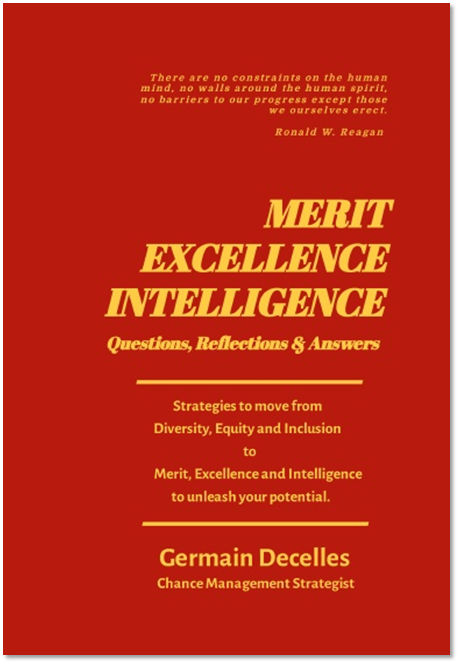 |
|
ISBN 978-1-7388000-8-7 |
 |
| Paperback:
350 Pages |
| Price: $34.50
us - $39.95 cdn - 33.30 Euro - $39.50 AUD - 31.87 GBP |
Shipped within
8 to 14 days.
|
|
USA & International |
 |
ISBN 978-1-7388000-8-7 |
| Paperback:
350 Pages |
| Price: $34.50
us - $39.95 cdn - 33.30 Euro - $39.50 AUD - 31.87 GBP |
 |
|
|
USA |
 |
ISBN 978-1-7388000-8-7 |

|
|
Great Britain |
 |
ISBN 978-1-7388000-8-7 |

|
|
|
Acheter de l'imprimeur |
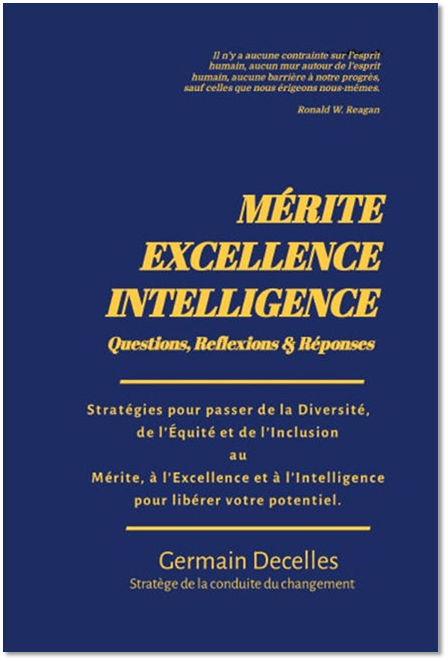 |
ISBN 978-1-7388000-9-4 |
|
| Livre de poche,
350 Pages |
| Prix: $34.50
us - $39.95 cdn - 33.30 Euro - $39.50 AUD - 31.87 GBP |
|
Expédié dans
les 8 à 14 jours.
|
|
|
|
|
| |
| |
| |
| |
| |
| |
| |
| |
|
|
| |
| |
|
|
| |
| |
|
|
| |
| |
| |
| |
| |
| |
|
|
|
| |
| |
| |
| |
| |
|
|
|
|
| |
| |
| |
| |
| |
|
|
|
|
| |
| |
| |
|
|
|
|
| |
| |
| |
| |
| |
|
|
| |
| |
|
|
|
|
|
|
|
| |
| |
|
|
| |
| |
|
| |
| |
| |
| |
| |
|
|
| |
|
|
|
MERIT,
EXCELLENCE, INTELLIGENCE |
Unlock Your Potential:
Moving from
Diversity, Equity, and
Inclusion (DEI) to Merit,
Excellence, and Intelligence
(MEI).
This book is for
those who are ready to
question their life's path and
deeply reflect on their
contribution to society. By
understanding and valuing
MERIT, EXCELLENCE and
INTELLIGENCE, a future of
success becomes achievable. |
|
|
|
|
We all have the potential to improve ourselves! |
| |
|
Do you want to deepen your understanding of meritocracy, explore the
paths to excellence, and develop
your intellect to overcome obstacles
with the ultimate goal of improving
your chances of success in life? |
| |
|
Whatever path you choose - financial, spiritual,
physical, mental,
emotional,
philanthropic,
community, or
family - it is
crucial to
recognize that you
alone are
responsible for
earning your
place. |
| |
|
Regardless of your culture, race, religion, economic
or social
background, the
understanding of
merit, excellence,
and intelligence
is universally
recognized as
vital for the
well-being of
individuals,
families,
workplaces, and
society. |
| |
|
Whatever your goals, merit, excellence, and intelligence are the
foundations of success. |
| |
|
Many self-help books offer quick fixes, but personal development will not
occur simply by following prescribed
steps. It requires much more! |
| |
|
To realize your potential, you need a detailed program to shape your
future. That's the goal of
« Merit,
Excellence, Intelligence
» which
will help you create a clear program
for your personal growth, success,
and happiness. |
| |
|
The fundamental principles of this book will guide you to change your
future and discover your authentic
self as soon as possible. It's time
to ask questions, get answers, and
reflect. |
|
|
|
Remember, changing your life for a better destiny depends entirely on
you! |
| |
|
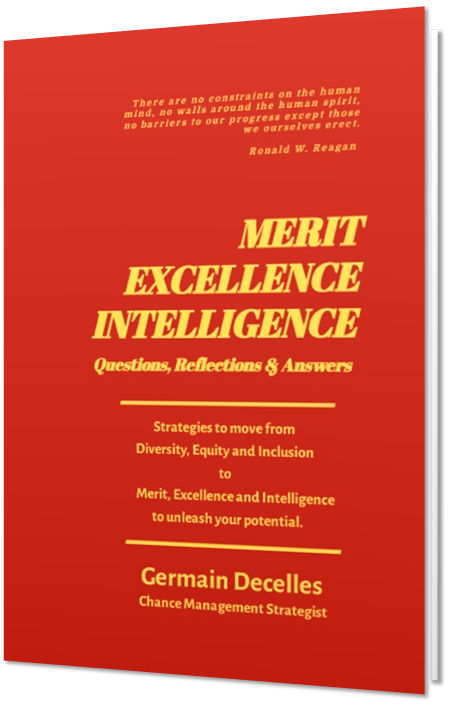 |
| |
|
|
|
|
|
Why Merit, Excellence & Intelligence
Still Matter in a Chaotic World
|
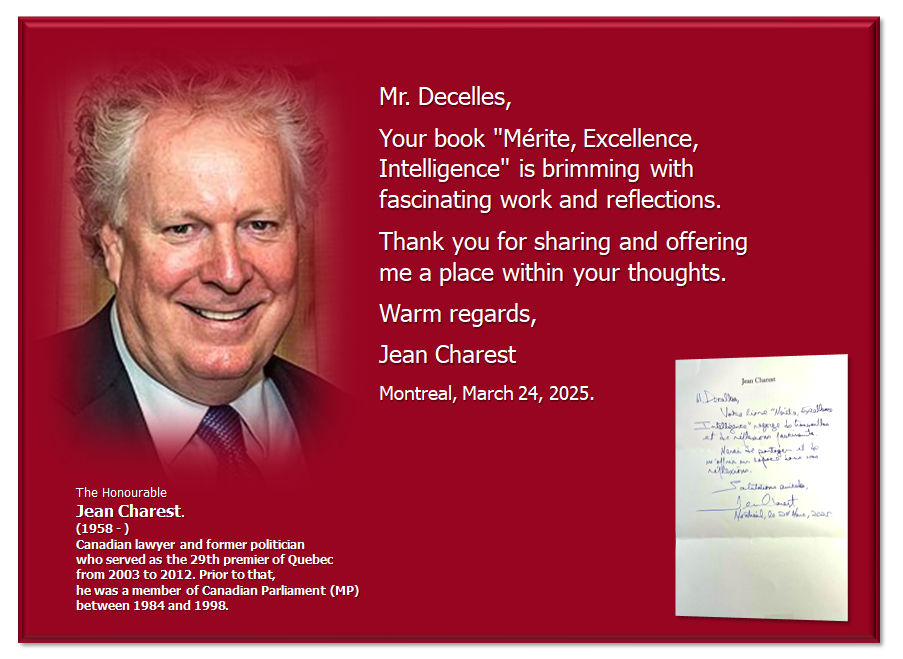
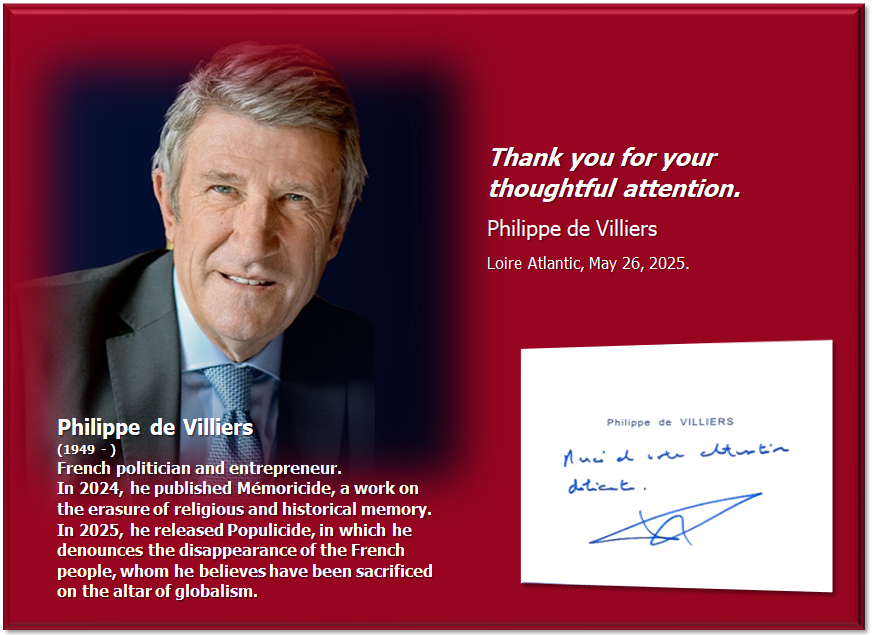
|
|
|
MERIT, EXCELLENCE, INTELLIGENCE –
The
book
A critical reading
In a perspective of supporting the reader, we used the
Copilot AI software in order to offer two levels of
critical analysis of the book Merit, Excellence,
Intelligence.
A :
A critical approach
B :
An argued (or reasoned) defense |
 Click here for more details
Click here for more details
|
TABLE OF
CONTENTS |
| CHAPTER
1 –
Happiness in life
|
IN SEARCH OF
HAPPINESS?
What is happiness?
What is happiness in life?
What
is fleeting happiness?
What is
true happiness?
What makes
happiness stable and real?
How
to define happiness in life?
What makes someone happy?
What
does a happy person look like?
What are the main characteristics
of happy people?
1. Happy
people love themselves:
2.
Happy people feel a sense of
personal control:
3. Happy
people are optimistic:
4. Happy
people are outgoing:
5. Happy
people have close relationships:
6. Happy people have a spiritual
foundation:
7. Happy people
tend to have balanced lives:
8.
Happy people are creative:
LIFE'S PURPOSE
What
exactly is your life purpose?
Is your life purpose, your
contribution?
How does life
purpose evolve?
How do we find
our purpose in life?
What is
your purpose?
Why do we
look for a purpose in life?
How
do we know when we have found our
purpose?
BALANCE IN LIFE
Are you seeking a better
balance in your life?
1.
Learn to say « no »:
2. Take
time for yourself:
3. Take care
of your mental and physical
health:
4. Meditate:
5.
Spend time with family and
friends:
6. Spend more time in
nature:
7. Do what you love:
8. Disconnect: |
|
|
| CHAPTER
2 – Law and society
|
LAW IN HUMAN EVOLUTION
LAW: THE ESSENTIAL ELEMENT
Why
do we need laws?
Why are laws
important for the organization of
life in society?
Does law
express the values of a society?
Are the rules of law, the only
other social rules?
LAW AND
CULTURAL NORMS
Are we supposed
to ignore the law?
THE LAW
AND THE TRAVELER AND THE EMIGRANT
THE LAW – FRÉDÉRIC BASTIAT
1. The law does not create
the law, but discovers it:
2.
The State cannot do what an
individual does not have the right
to do:
3. The law cannot be an
instrument of equalization without
becoming despoiling:
4. The
law can only be negative: |
|
|
| CHAPTER
3 – Knowing yourself
is knowing others |
How to
discover yourself?
1. Make
sense of your story:
2. Focus
on your strengths:
3. Embrace
silence:
4. Find meaning:
5.
Therapy can help:
HOW WE
PERCEIVE OURSELVES
Are we
inclined to believe too easily?
What are the differences between
naive and useful idiot?
How can
a naive as well as a useful idiot
improve?
THINK FOR YOURSELF
OR WHAT SHOULD YOU THINK
How
to develop critical thinking
skills?
How to create your own
thinking?
Are there benefits to
practicing self-awareness?
THE EMOTIONS THAT SURROUND YOU
How to discern those who suffer
from low emotional intelligence?
1. They always have to be right:
2. They ignore other people's
feelings:
3. They behave
insensitively:
4. They blame
others for their problems:
5.
They have poor coping skills:
6. They have emotional breakdowns:
7. They have relationship
difficulties:
SELF-AWARENESS
Why is
self-awareness important?
What
is self-awareness?
Why is it
important to be self-aware?
How
to improve self-awareness?
1.
Find and nurture your passions:
2. Forget the past:
3. Set
goals:
4. Appreciate what you
have:
5. Rethink what
relationships are important:
HOW TO SPOT BAD AND GOOD
PEOPLE
1. They are passive
aggressive:
2. They don't seem
supportive:
3. You feel
uncomfortable around them:
4.
They don't listen to you:
5.
They don't make any effort:
MANAGING THE FRUSTRATION OF
OTHERS
How can they be so...
stupid?
How to adjust your
perspective?
1. The difference
between stupidity and bad
personality:
2. Not everyone
can meet your standards:
3. A
person's background and drawbacks:
4. Don't judge other people's
abilities:
MANAGING A
DIFFICULT PERSON
How to deal
with stubbornness?
1. Refusal
to change:
2. Rigidity:
3.
Difficulty in compromising:
4.
Resistance to authority:
5.
Defensive behavior:
How to
avoid disagreements?
1. The
difficulty in changing a stubborn
person:
2. Avoid controversial
topics:
3. Be kind:
4. The
emotional reaction:
5. No
gossip or complaints:
6. Ignore
them:
7. Walk away from a
dead-end situation:
What to
think of « busybody »?
THE
INTELLECTUAL LEVEL
1. Lack of
skills:
2. Be prepared to
explain things further:
3. Be
respectful:
4. Recognize and
encourage their strengths: |
|
|
| CHAPTER
4 – The character and
value of a person |
STRENGTH OF CHARACTER
ESSENTIAL VALUES
What is
integrity?
1. They value
other people’s time:
2. They
give credit where credit is due:
3. They are genuine:
4. They
are always honest:
5. They
never take advantage of others:
6. They don’t argue when they
disagree:
7. They usually give
people the benefit of the doubt:
8. They know when something is
bothering someone:
9. They
believe others:
10. They
apologize first:
11. They are
humble:
12. They do good when
they can:
13. They are always
kind to those in need:
What is honesty?
What is
courage?
1. The difference
between courage and bravery:
2.
Courage is contagious:
What makes a person loyal?
What
describes kindness?
How to
recognize a bold person?
1.
Being bold:
2. Being bold is a
good trait:
How important
is patience?
Demonstrate
perseverance?
What is firmness
in leadership?
THE LOSS OF
CONFIDENCE
Do you have
confidence in yourself?
1.
Don’t get distracted:
2. Work
on your weaknesses:
3. Believe
in yourself:
4. Examine your
successes:
5. Keep track of
compliments received:
6. Seek
validation from others:
7. Take
on challenges:
8. Above all, be
positive:
9. Know how to act
towards others:
FEAR
What is the root cause of
fear?
What is fear, really?
Why is fear a lie?
How to
overcome fear?
What does it
mean to make yourself a « man »?
Do you show courage when you are
wrong?
1. Practice
humility:
2. Recognize what’s
stopping you from saying « I was
wrong. »
3. It’s okay to
explain that at the time, the
decision made sense:
4. Be open
to learning:
5. Admit when
you’re wrong:
What about
speaking your mind?
1.
Timing is important:
2. Be
specific:
3. Be objective and
don’t let yourself be influenced
by emotion:
4. Targeted
solutions are appreciated:
5.
Focus on the positive:
6.
Always be polite and respectful:
THE VALUE OF A PERSON
How
to recognize a valuable person?
What is a valuable person?
What
gives a person value?
Where is
the true value of a person?
How
is a person's value measured?
How to become a valuable person?
PERSONAL AND MORAL VALUES
How to develop a good
understanding of your values?
Do you have a clear understanding
of moral values?
Do you
understand the distinctions
between ethics, moral values and
personal values?
1. Ethics:
2. Moral values:
3. Personal
values:
COMMON SENSE |
|
|
|
CHAPTER
5 – The realities of
life
|
THE
QUESTIONING
What questions
should we ask ourselves about the
realities of life?
1.
Relationships are a two-way
street:
2. Many things you
don’t like in your life are your
fault:
3. There are bad people
in the world:
4. Life doesn’t
give us anything:
5. Plans
frequently go off the rails:
6.
You can’t go back and change the
past:
7. The grass isn’t always
greener on the other side:
8.
Not all relationships last:
9.
Good things happen to bad people:
10. Bad things can happen as a
result of your actions:
11. You
won’t always be able to move on
easily:
12. Life will never be
perfect:
13. Life goes by so
fast:
14. You can only control
yourself and your actions:
15.
You can’t count on anyone but
yourself:
16. There will be bad
days:
17. Failure is part of
the plan:
18. Even if something
isn’t your fault, it can still be
your responsibility:
19. Your
loved ones will pass away:
20.
Kindness isn’t always rewarded:
21. Fairness is rarely considered:
22. Busy doesn’t equal
productivity :
23. Actually,
you have time:
What are
the sad realities of life that you
must learn to accept?
1.
Bad things happen to good people:
2. The education system doesn’t
provide the right tools to
succeed:
3. The government
isn’t there to help you:
4.
Most of society is steering you in
the wrong direction:
5. Money
is extremely important, no matter
what people tell you:
6. You
have to fail at something if you
want to do something great:
7.
There will always be hate and
crime:
8. Achieving big goals
is hard:
9. Social media can
ruin your life if you let it:
10. The health and diet industry
doesn’t care about your health:
11. You can’t please everyone:
12. Negativity is everywhere:
What are the harsh realities that
actually help us move forward in
life?
1. The first steps
forward are rarely easy:
2.
Progress is slow and incremental:
3. You will always have less
control than you would like:
4.
You can’t avoid risk without
avoiding life:
5. Your biggest
daily problems are often in your
head:
6. Long-term happiness
can’t be bought, it has to be
earned:
7. Not everyone will
support you:
8. You are better
off without certain people in your
daily life:
9. You can’t have
joy in life without occasional
pain:
10. Life is constantly
changing, day by day:
POSITIVE THINKING
What is a
positive mental attitude?
Is it
important to have a positive
mental attitude?
Does your
attitude have a profound impact on
you and others?
1.
Self-centeredness:
2.
Resistance to change:
3.
Resentment:
4. Jealousy:
5.
Procrastination:
6. Avoiding
difficult conversations:
7.
Gossiping:
8. Complaining:
9. A victim mentality:
10.
Impatience:
11. Pessimism:
12. Cynicism:
13. Excusing:
14. Giving up:
15. Seeking new
experiences:
What does a
positive mindset look like?
1. Resilience:
2. Courage:
3. Optimism:
4. Gratitude:
5. Acceptance:
6. Be curious:
7. Smile and kindness:
8. Be
kind to yourself:
9. Don’t take
things personally:
10. Rejoice
in others’ success:
|
|
|
CHAPTER
6 – Human values
|
THE DIFFERENCE BETWEEN VALUES
What is the difference between
human values, ethical values and
Moral values?
1. Human
values:
2. Ethical values:
3. Moral values:
THE
MOST IMPORTANT HUMAN VALUES
1. Freedom:
2. Justice:
3. Fairness:
4. Respect:
5.
Tolerance:
6. Honesty:
7.
Ethics:
8. Responsibility:
9. Loyalty:
CLARIFY
YOUR PERSONAL VALUES
What are
core personal values?
How are
personal values formed?
What is
a personal value system?
Why
are core personal values
important?
Are personal values
final?
What are your personal
values?
1. Self-respect:
2. Courage:
3. Adaptability:
4. Flexibility:
5. Personal
well-being:
6. Personal growth:
7. Well-being:
8. Family:
9.
Uniqueness:
10.
Open-mindedness:
11. Integrity:
12. Trustworthiness:
STAND IN DEFENSE OF OTHERS
Why
defend others?
1. Know your
values:
2. Analyze the
situation and assess the risks:
3. Decide on action:
4. Defend
yourself appropriately:
NOT TO BE OFFENSIVE
1.
Think and choose your words
carefully:
2. Be an active
listener and paraphrase:
3. Let
people share their perspectives:
4. Give warm feedback:
5. Ask
open-ended questions:
6. Ask
for explanation:
7. Ask for
advice and suggestions:
8.
Don’t take things personally:
9. Be humble in your speaking:
10. Exhibit confidence when
speaking:
11. Always have a
clear and firm point of view:
12. Use confident body language:
13. Do your homework and prepare:
14. Visualize in advance:
15.
Speak slowly and allow for
silences:
16. Correct negative
issues quickly:
17. Ask for
change instead of pointing out a
mistake:
18. Criticize
behavior, not personality traits:
19. Value actions over results:
20. Manage feelings of superiority
carefully:
SURROUND
YOURSELF WITH THE RIGHT PEOPLE
What should be considered when
setting boundaries?
1.
Learn to be happy alone:
2.
Define what you want from your
relationships:
3. Be positive:
4. Be true and authentic:
5.
Free yourself from toxic people:
Why do you attract evil?
1.
You constantly want to please
others:
2. You try to find a
solution to every problem:
3.
You lack self-confidence:
4.
You don’t assert yourself enough:
How to stop attracting bad people?
1. Set boundaries:
2. Manage
your emotions:
FAMILY
VALUES
How to establish a
family unit?
HAVE
CONFIDENCE
DEFINE YOUR
CULTURE
KNOW HISTORY
HAVING A NATIONAL
CONSCIOUSNESS |
|
|
| CHAPTER 7 –
Mental manipulation
|
|
What are the forms of
manipulation?
1. Positive
Manipulation:
2. Egocentric
Manipulation:
3. Malicious
Mental Manipulation:
What
are the characteristics of
manipulators?
How to identify a
manipulator?
1. The
manipulator seduces:
2. The
manipulator makes you feel guilty:
3. The manipulator denigrates and
devalues you:
Are there
several mind control techniques?
1. Flattery:
2. Gaslighting:
3. Straw Man Strategy:
4.
Threats and Blackmail:
5.
Scapegoat Strategy:
6. Double
Dealing:
7. Seduction:
8.
Victimization:
What are
the consequences for victims?
How to get rid of psychological
manipulation or brainwashing?
1. Become aware of your condition:
2. Take some distance and be firm:
3. Take drastic measures:
PSYCHOLOGICAL VAMPIRISM
1. Narcissism:
2. The
Victimized:
3. The Controlling:
4. The Talkers:
5. The Drama
Queens: |
|
|
| CHAPTER
8 –
Social, economic and
political context
|
WE ARE NOT ALL THE SAME
DIVERSITY, EQUITY AND INCLUSION
What is DEI?
1. What is
Diversity?
2. What is
Equity?
3. What is Inclusion?
4. Why are Diversity, Equity, and
Inclusion Important?
5. How to
Implement DEI in the Workplace?
THE OTHER SIDE OF THE COIN
Are there any problems with DEI?
THE POLITICALLY CORRECT
What does the term « politically
correct » mean?
What is the new
term for « politically correct »?
What does the word « woke » mean?
What is a politically correct
person?
What exactly does it
mean to be « politically correct »
these days?
What if freedom of
speech was undermined?
WOKEISM
What about « woke »
jargon?
1. Anti-racism:
2. Equity:
3. Critical race
theory:
4. Systemic or
structural racism:
5. Social
justice:
6. Microaggression:
7. A bias or implied association:
8. « White » fragility:
What is the best way to chat with
a « woke » person?
THE
SOURCE OF THE « WOKE» PROBLEM
A. The family challenge
How to
prepare your child for life?
1. Good Relationships:
2.
Valuing Education:
3. Promoting
Healthy Living:
4. Teaching
Respect:
5. How to Be
Responsible:
6. Learning to
Work Hard:
7. Spiritual Values
and Beliefs:
8. How to Develop
Patriotic Values:
How to
evolve alone in life?
B.
The educational challenge
What
is the purpose of an educational
system?
What is ideology in
education?
What is
indoctrination in education?
What is a « woke curriculum? »
What is the influence of « woke
philosophy » in education?
How
to interact with the teacher?
RADICAL IDEOLOGY
The
vocabulary?
1. Antonyms for
radical:
2. Radical belief
based on faith:
3. Radical
communism:
4. A radical person:
5. Radical Marxist theorist:
6.
Radical economist:
7. Fascism
in simple terms:
8. Radical
thinking:
9. A radical state of
mind:
THE MEMORICIDE
THE MEDIA AND GOVERNMENTS
Are we in a world of fact
manipulation?
Why journalists
must be honest?
What is the
journalistic process?
What is a
news commentator?
CARING
ABOUT POLITICS AND GOVERNMENT
Who makes these laws and what
impact do they have on us?
How
can we understand the issues?
1. The importance of being aware
of the problems around us:
2.
Being socially aware:
3. Being
aware of your society:
4. Being
aware of the issues in our
society:
5. Politics and its
meaning:
6. Politics is
important for society:
7. A
political awareness:
8. Being
politically aware:
9. Comparing
politics:
10. Being aware of
the world:
11. Be aware of
globalization:
What to
consider when voting? |
|
|
|
CHAPTER 9 –
Merit
|
How can we define « merit »?
How can we recognize « merit »?
What should be considered when
assessing « merit »?
How can we
avoid falling into the trap of
judging others?
LIFE IS A
SERIES OF TRIALS
MERITOCRACY
What is Integrity?
What is Honesty?
What do we
mean by Willingness to Learn?
How to Improve?
TAKING
RESPONSIBILITY
STRONG
CHARACTER TRAITS
EXERCISE
COMMON SENSE
ADMIT THAT
YOU ARE WRONG
COWARD OR
HERO
BE UNCONVENTIONAL
PERSEVERANCE
SUCCEED
BY « MERIT »
1. Visualize
success:
2. Set concrete goals:
3. Write down your goals:
4.
Describe your action plan:
5.
Set a timeline:
6. Identify
potential obstacles:
7. Reflect
and adjust:
THE
ESSENTIAL IN THE MERIT
Are «
merit » system principles
important?
1. Concern for
customers and public interest:
2. Effectiveness and efficiency:
Performance management according
to the « merit » system?
1.
Planning:
2. Monitoring:
3.
Development:
4. Evaluation:
5. Reward: |
|
|
|
CHAPTER
10 –
Excellence |
THE PATH TO
EXCELLENCE
How to achieve
excellence while avoiding failure?
1. Know yourself, know your
strengths and weaknesses:
2.
Set realistic goals to achieve:
3. You must always be focused:
4. Take care of your mental and
physical health:
5. Be thirsty
for knowledge:
6. Be careful
about your company:
7. Always
be faithful to your commitments
and follow-up:
8. Choose to
excel despite the level of
difficulty:
9. Be open to
change:
10. Maintain an
optimistic attitude towards
yourself and your goal:
What does the value of excellence
symbolize?
How do we
demonstrate excellence?
How do
we achieve a sense of
accomplishment?
What about
kindness and healthy efforts?
EXCELLENCE IN WORK
How to
clarify the value of excellence at
work?
1. The concept of
Excellence:
2. The value of
excellence in Business:
3.
Excellence and Business Ethics:
4. Quality and Excellence
Management:
5. Standards of
Excellence:
LEADERSHIP
AND EXCELLENCE
How to ensure
excellence?
1. A clear
vision:
2. Enrolling others:
3. Leaders stand for something:
4. Empowering others:
5.
Evaluating progress:
6.
Encouraging:
What are the
characteristics and common traits
of people who excel?
1.
They are the masters of
themselves:
2. They are curious
about everything:
3. They bring
added value:
4. They create
opportunities and accept change:
5. They are not passive, but
interactive:
6. They leave a
legacy:
How can we find
excellence through others?
1. Identify Talented People:
2.
Seek Mentorship:
3. Collaborate
with Diverse Teams:
4. Listen
and Learn Actively:
5. Give
Constructive Feedback:
6.
Celebrate Achievements:
7.
Foster a Culture of Continuous
Learning:
8. Empower Others:
9. Be Open to New Perspectives:
SOCIAL EXCELLENCE
How to
reach excellence? |
|
|
| CHAPTER
11 –
Intelligence |
HUMAN
INTELLIGENCE
Is intelligence
something innate?
Does having a
degree automatically mean a higher
level of intelligence?
Would
you like to be smarter?
Can I
be open-minded?
1. Be aware
of your biases:
2. Consider the
opposing point of view:
3.
Support good intentions:
4. Ask
questions:
5. Think from a
neutral point of view:
6. Make
new connections:
Do you
reject new ideas?
TRUE
INTELLIGENCE
1. How do
people think?
2. Critical
thinking:
3. Problem solving:
4. Goal setting:
5. Emotional
intelligence:
6. Enjoying
solitude:
7. Adaptability:
8. Resilience:
9. Curiosity:
10. Open-mindedness:
11.
1Self-criticism:
12. Continuous
learning:
13. A sensitivity to
the experiences of others:
14.
Courage as a factor of
intelligence:
15. Appreciation
of the arts:
STREET
SMARTS
1. Embrace
experiential learning and be
willing to make mistakes:
2.
Life is full of uncertainties and
discomfort:
3. Adopt diverse
perspectives:
4. Admit when you
are wrong:
5. Avoid
cherry-picking or forcing
information to fit your
expectations:
6. Read between
the lines of what is said:
7.
The importance of studying sales
and marketing:
IMAGINATION |
|
| CHAPTER
12 –
Make your life a reality
|
YOU DO NOT
KNOW WHAT TO DO WITH YOUR LIFE
How to achieve it?
1.
Examine where you are now:
2.
Change your perspective:
3.
Identify your passions and
talents:
4. Let your curiosity
guide you:
5. Accept the
unknown:
6. Accept that
mistakes are part of the process:
7. Monitor your progress:
8.
Seek inspiration from others:
9. Understand your purpose:
10.
Set realistic goals:
11. Find
strength in flexibility:
12. Be
patient and persistent:
13.
Seek professional advice:
IDENTIFY YOUR LIFE GOALS
What do you need to clarify before
you start identifying?
How to
develop a growth mindset?
How
to create an action plan?
A.
Set your goals:
1. Clarify
your life goals:
2. Recognize
your strengths:
3. Value
qualified people:
4. Identify
obstacles that may interfere with
your goal:
B. Create a
plan:
1. Talk to someone
who has succeeded:
2. Create an
action plan to achieve your goals:
Evaluate your progress:
C. Change your perspective:
1. Learn to delay self-esteem:
2. Cultivate your determination:
3. Work on your social skills:
4. Have confidence:
5. Accept
change:
DON'T WASTE
YOUR TIME
How to use your most
valuable asset?
1. Believe:
2. Know where you are going:
3.
Seek true success:
4. Live in
the moment:
5. Defer short-term
thrills for long-term rewards:
6. Always keep learning:
7.
Don’t worry about details:
8.
Respect morals:
How to
stop wasting time?
1. Stay
off the internet:
2. Keep your
email inbox closed:
3. Cell
phone text messages:
4. Do all
your work on one device:
5.
Make a schedule:
6. Try to
batch tasks when you can:
7.
Slow down:
8. Stay focused on
the task at hand:
9. Try to
prioritize your tasks:
10. Give
yourself some downtime:
DISCOVER YOUR PASSIONS
Are
Passions the Same as Hobbies?
How to live a life of passion and
determination?
1. Schedule
regular time to pursue your
passion:
2. Connect with
like-minded people:
3. Continue
to learn and grow:
4. Share
your passion with others:
5. Be
patient and kind to yourself:
How to discover your passion?
1. Engage in introspection:
2.
Experiment and explore:
3.
Embrace the principle of trial and
error:
4. Seek advice from
those with particular passions
5. Be consistent in your
commitment to your passion:
SELF-DISCIPLINE
How
to find motivation?
Are failure
victories?
PEOPLE NEED
RULES
OFFERING HOPE
LEAD BY EXAMPLE
BE
ENTHUSIASTIC FOR THE FUTURE |
|
| ABOUT THE AUTHOR |
In
addition to his
writing activity,
Germain Decelles plays
a role as a strategist
and facilitator in
change management.
Each year, he offers
several seminars and
training sessions on
change management,
transformation, and
business innovation.
In addition, he is the
president of WebTech
Management and
Publishing
Incorporated.
With over 40 years of
experience in business
and consulting on
local and
international markets,
Germain Decelles has
worked in various
sectors such as
retail, distribution,
information and
communication
technologies,
transportation,
manufacturing,
financial services,
and government
organizations.
He has received
training from
prestigious
institutions such as
the Ford Motors
Management Institute,
the Chrysler Leasing
Institute, the
International
Forecasting Institute,
McGill University, the
Kappa Institute, and
the Digital Equipment
Computer Institute. He
holds a master's
degree in business
administration from
Concordia College &
University and a
certificate in
business management
and organization from
Hautes Études
commerciales de
Montréal. |
|
|
| |
Germain Decelles, o.s.j., MBA |
|
|
A retired
member of the Canadian Coast Guard
(S.A.C.S.M.), Germain Decelles
serves as the secretary of the
General Assembly and as an
international advisor. In 1990, he
received the Admiralty Service
Award for promoting the service
internationally. He is also a
member of the Sovereign Order of
Saint John of Jerusalem. |
|
Germain
Decelles and his family reside in
Montreal, Quebec, Canada. |
|
You can contact him at the
following address:
gdecelles@webtechmanagement.com |
|
|
| |
|
|
|
|
|